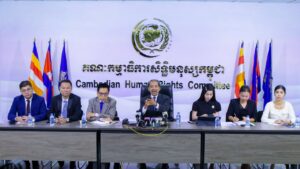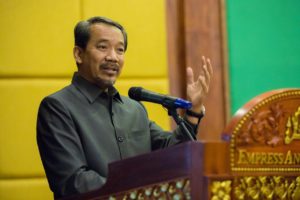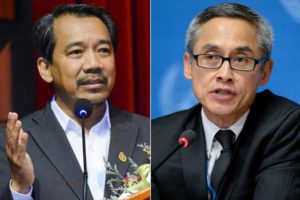CHRC បដិសេធរបាយការណ៍សេរីភាព
Cambodian Human Rights Committee (CHRC) vice-president Chin Malin said civic space in Cambodia is not shrinking. Instead, it is widely open, but those who enjoy civic space must respect the constitution and the law.
“For Cambodia, civic space means allowing everyone to express their politics freely in accordance with the constitution and the law. All actions that violate the constitution and the law and subsequently face legal action are not indications of the shrinking of civic space. Enforcing the law is to promote civic space, rights and freedom,” Malin said.
Malin’s remarks came in response to UN High Commissioner for Human Rights Michelle Bachelet’s statement made on February 26 in the 46th session of the Human Rights Council. Bachelet said there has been serious contraction in civic space across Southeast Asia, particularly in Myanmar, Cambodia, Indonesia – including the Papua region – Thailand and Vietnam.
She said people in these countries have gathered peacefully to call for governments to uphold rights and to implement democratic principles and the rule of law. But in return many activists, human rights defenders and journalists have been subjected to arbitrary detention and arrest, violence, and have faced highly punitive criminal charges and sentences.
“I am particularly concerned about the severe shrinking of civic space in Cambodia, where increasing and disproportionate legislative and administrative measures limit the rights to free expression, peaceful assembly, association and information, among others,” she said.
Malin said the context of civic space is different from country to country and each country has different laws. For Cambodia, he said Bachelet should consider its law, especially the legal basis for each case that the government has sent to the UN.
“This is better than to look only at the reports submitted by other groups that oppose the government. If she cannot understand the situation in Cambodia, she should compare accusations from the opposition to explanations from the government,” he said.
Malin said the situation in the region could not be generalised to a single country because each country has a different context in terms of its political sphere, political regime, legal and social perspective.
Political analyst Lao Mong Hay said Bachelet’s remark is obvious. The government, he said, has again rejected similar remarks because they fear the truth could expose their failure to honour human rights obligations under the Paris Agreements, the country’s |Constitution and their own oath of office.
“If admitted, these failures would undermine the legitimacy of its power,” he said, adding that the country’s current leadership did not seem to have a lot of capacity, and has not shown much intention to democratically resolve the nation’s issues right from start.
Cambodia, he said, was at a particularly critical juncture prior to the leadership’s transition where opposition was very much there among Cambodians and where the country’s situation was not so good for the people.
“It is highly doubtful the current leadership is willing to relax its repressive measures, to open democratic space, and to let people enjoy and exercise their constitutional rights,” he said.




